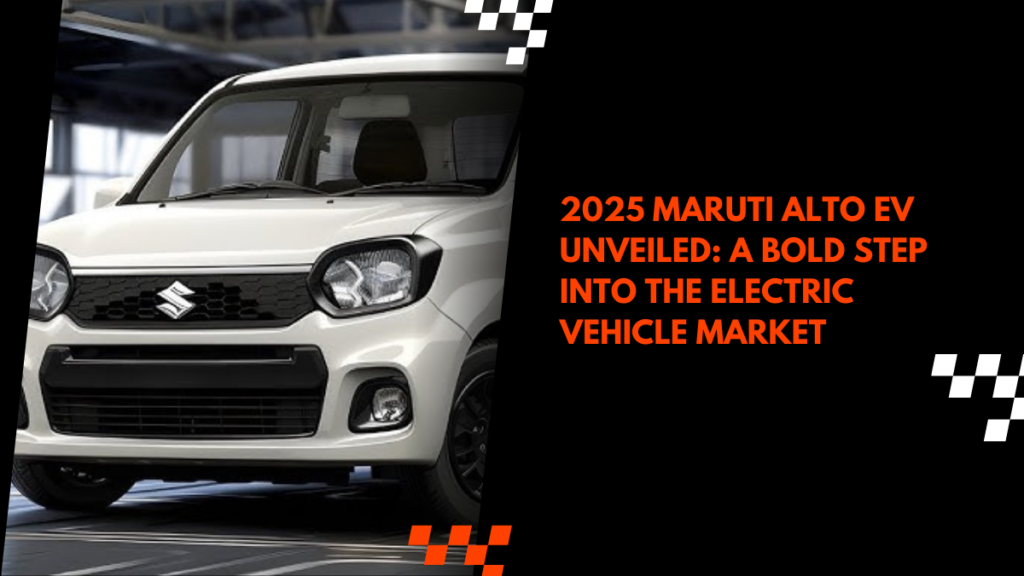The Maruti Alto has been a favorite car for millions of families in India for years. It’s been the reliable companion that takes kids to school, newlyweds on their honeymoon, and families on memorable road trips. Since its launch, the Alto has become one of the most trusted cars on Indian roads, known for its affordability and practicality. Now, the Alto is ready for a major transformation. In 2025, it will shift from its traditional petrol engine to an eco-friendly electric powertrain, marking an exciting new chapter in its long history. The Alto EV will retain the charm of its past while embracing a future focused on sustainability and cutting-edge technology, making it more appealing for today’s eco-conscious drivers. It’s a big step toward a cleaner, greener future and a glimpse into how the car industry in India is evolving.
Why Maruti Suzuki is Going Electric
You might be wondering why Maruti Suzuki, a brand known for its affordable petrol cars, is making the shift to electric vehicles (EVs). The main reason is that the world, including India, is facing a climate crisis, and pollution in Indian cities is becoming a growing problem. The Indian government is also pushing for more electric cars to be on the road, and Maruti Suzuki is stepping up to lead the change. By introducing an electric Alto, Maruti Suzuki is not only responding to environmental concerns but also adapting to the rapid shift in the market toward EVs. Electric cars are no longer seen as luxury items but are becoming a necessity for all. With competitors entering the electric car market, this move ensures that Maruti Suzuki remains at the forefront of innovation and continues to provide affordable solutions for Indian families.
Also Read- The Mahindra BE6: A Premium Experience with Next-Gen Features
Powering the Alto EV: What We Know So Far
The technology behind the Maruti Alto EV is expected to bring significant improvements over its petrol-powered version. While many details are still under wraps, industry insiders suggest that the Alto EV will offer different battery options depending on the customer’s needs. The base model might feature a 20 kWh battery, offering a range of 200 km on a full charge. This range would be perfect for everyday urban driving. For those who want to travel longer distances, a 30 kWh battery variant might offer a range of 300 km. Along with this, the Alto EV is expected to deliver instant torque, making it a fun car to drive. With its lightweight body and an estimated 40-50 horsepower, the Alto EV should offer zippy performance, especially suited for navigating the busy streets of India’s cities.
Charging Infrastructure and Smart Features
A major concern with electric vehicles is the availability of charging stations. To address this, Maruti Suzuki is working with local businesses and power companies to set up a wide network of charging points across India. The goal is to ensure that there’s a charging station every 25 kilometers on major highways and that each neighborhood in major cities has fast-charging stations. Maruti is also planning to integrate smart features into the Alto EV. One of the most exciting possibilities is the Vehicle-to-Grid (V2G) technology. This technology allows the car to interact with the power grid, meaning the car could provide power during electricity outages or even sell back excess energy during peak hours. These innovations will make the Alto EV not only more convenient to own but also an important part of India’s energy solutions.
A Familiar Yet Futuristic Design
The design of the Alto EV will maintain its classic compact and city-friendly look, but with a modern twist. Maruti Suzuki is expected to replace the traditional air intake grille with a sleek, closed-off design to improve aerodynamics. The car will likely feature stylish LED headlights and possibly a light bar, giving it a futuristic edge. Inside, the Alto EV will focus on simplicity and comfort. It’s expected to come with a large touchscreen infotainment system and a user-friendly interface, catering to a wide range of consumers. Additionally, the interior may have a modular design, allowing owners to adjust the layout according to their needs—whether that means more space for cargo or additional seats for family trips. This balance of familiarity and innovation will make the Alto EV both practical and attractive for Indian buyers.
Making EVs Affordable for the Masses
While the initial cost of electric vehicles can be higher than traditional petrol cars, Maruti Suzuki is working hard to make the Alto EV affordable for a larger number of people. Industry experts predict that the base model of the Alto EV will cost around ₹5-6 lakhs, which is more expensive than the petrol Alto but still within reach for many Indian families. Additionally, the Alto EV’s running costs are expected to be much lower than a petrol car, thanks to cheaper electricity compared to fuel and minimal maintenance requirements. Maruti Suzuki may also offer innovative financing options like monthly subscription models or battery leasing, making it even easier for buyers to switch to electric. With government incentives further lowering the cost, the Alto EV could be an affordable and practical choice for many people in India.
The Ripple Effect on India’s Automotive Industry
The launch of the Maruti Alto EV will have a transformative impact on India’s entire automotive industry. Maruti Suzuki is a market leader, and when they introduce a new product like the Alto EV, other car manufacturers are likely to follow suit. This could result in more affordable electric vehicle options for Indian consumers in the future. The shift to electric vehicles will also affect the wider ecosystem, from component suppliers to auto mechanics and driving schools, all of whom will need to adapt to the changes brought on by EV technology. The Alto EV could play a major role in normalizing electric cars on Indian roads, turning them from a novelty into the new standard. As EVs become more common, they will no longer be seen as special but as the way forward for everyday transportation in India.
Overcoming Challenges
While the Alto EV promises a bright future, it will face several challenges along the way. One of the biggest concerns for potential buyers is range anxiety—the fear that the car won’t have enough charge to reach the destination. Although the range for the Alto EV is expected to be suitable for daily commuting, longer road trips may still be a concern for some. Charging infrastructure is still being developed, and the reliability of the power supply in some areas can be unpredictable. Additionally, Maruti Suzuki will need to train its large network of service centers to handle the new EV technology. Battery disposal and recycling will also become a significant issue as more EVs hit the roads. Maruti Suzuki has an opportunity to lead the way in establishing sustainable practices for battery management, ensuring that the shift to electric vehicles is both efficient and environmentally friendly.
For More- Suzuki Access 125: The Reigning Queen of Two-Wheel Adventures
Looking Ahead: The Future of Electric Cars in India
The Maruti Alto EV is just the beginning of Maruti Suzuki’s electric journey. The company plans to launch at least six new electric models by 2030, including electric SUVs, family cars, and even commercial vehicles. These future models will be built with lessons learned from the Alto EV and will further push the boundaries of electric mobility in India. Maruti Suzuki’s focus on local production of EV components is also in line with India’s “Make in India” initiative, which aims to boost domestic manufacturing and reduce reliance on imports. As the Alto EV paves the way for more electric vehicles on Indian roads, it is clear that the future of transportation in India is moving toward cleaner, greener, and more sustainable solutions.
Conclusion
The Maruti Alto EV marks a significant turning point in India’s automotive landscape, combining the trusted legacy of the Alto with a futuristic, eco-friendly design. With a focus on affordability, sustainability, and innovation, the Alto EV is set to make electric vehicles accessible to millions of Indian families. As Maruti Suzuki leads the way, the Alto EV has the potential to normalize electric mobility, helping India transition towards a cleaner and greener future.
FAQs
What will be the range of the Alto EV?
The Alto EV is expected to offer a range of 200 km on a full charge for the base model and 300 km for the higher variant.
Will charging stations be available across India?
Yes, Maruti Suzuki is working to build a network of charging stations with plans to have a charging point every 25 kilometers on major highways and fast-charging stations in cities.
Source link



